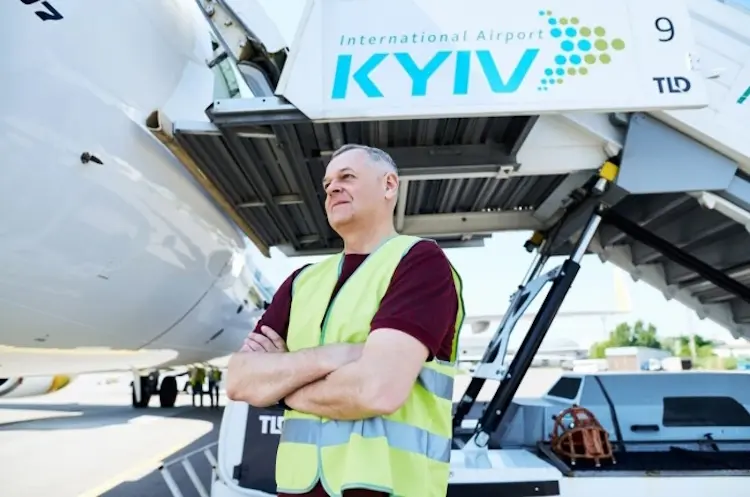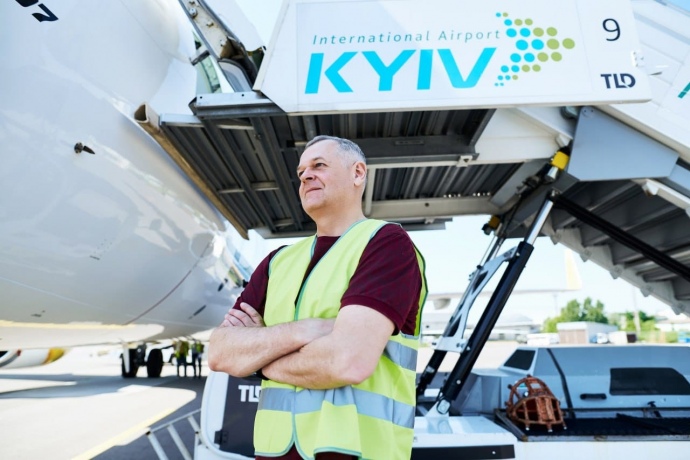From 20 Years of Decline to Sustainable Development: Public-Private Partnership in Action – Kyiv Capital Airport
Here’s the English translation:
Denys Kostrzhevskyi, the Chairman of the Board of Directors of Kyiv International Airport, shared his thoughts on the past and future of Kyiv’s first airport.
Kyiv Sikorsky International Airport, stands as one of Ukraine’s most significant airports, boasting a history spanning a century. Known for its extensive European flight network, modern terminals, and high service standards, the airport had a rocky path to achieving its current status.
In the early days of Ukraine’s independence, Kyiv Airport was in dire straits. The capital’s budget was hemorrhaging millions in subsidies, it was saddled with debts of 22 million hryvnias, and the passenger terminal, a relic from the mid-20th century, was on the brink of collapse. The airport’s short runway, unsuitable for modern aircraft, further hampered operations, leading to a near shutdown. By the late 2000s, the workforce had been slashed by ninety percent, leaving the airport a ghost of its former self.
The turnaround began in 2007 with the aerodrome’s reconstruction. By mid-2009, the revamped runway could accommodate Boeing 737-800 and Airbus A320 aircraft, marking a significant upgrade. However, despite these improvements, the outdated infrastructure struggled to attract passengers, with annual footfall languishing in the tens of thousands.
The game changer came in 2010 with a new law on public-private partnerships, coupled with the entry of Master-Avia LLC as a strategic investor. These developments catalyzed a transformation, steering Kyiv Airport from decades of decline towards sustainable development and placing it once again at the forefront of Eastern European aviation.

the Chairman of the Board of Directors of Kyiv International Airport
The capital was desperately seeking ways to improve its air infrastructure…
The real catalyst for the airport’s development was the 2012 UEFA European Football Championship, which Ukraine was preparing to host 14 years ago, expecting hundreds of thousands of foreign fans. With only two years remaining until the tournament in 2010, the urgency was palpable.
Crucially, one of the conditions set by the Euro 2012 organizers was that Kyiv needed to have two functioning airports to accommodate the teams and attendees.
Time was short, and there was a pressing need to design and construct a new, modern airport practically from scratch.
In May 2010, the Kyiv City Council announced a 49-year lease tender for the Kyiv Airport property complex. The winner, Master-Avia LLC, undertook a comprehensive reconstruction of the entire airport infrastructure and enhanced the capital’s air gateway capacity.
Denys Kostrzhevskyi stated, “The new terminal complex warmly welcomed over 100,000 guests of Euro 2012 and immediately became a hallmark of the capital—a favorite airport among Kyiv residents”
Kyiv Airport: A Journey from Municipal Debt to National Leader in Aviation
Kyiv Airport, once a struggling municipal enterprise, has transformed into one of Ukraine’s leading airports through strategic investments and a significant public-private partnership with Master-Avia LLC. This partnership was crucial in turning around the fortunes of the airport, starting with the complete repayment of its debts and the construction of the new International Terminal “A” in record time—just 10 months. This terminal, which replaced an unfinished building, now boasts a capacity of 520 passengers per hour.
The new terminal complex played a pivotal role during Euro 2012, hospitably accommodating over 100,000 guests and swiftly becoming a beloved landmark of the capital and the preferred airport for Kyiv’s residents.
From its neglected status, Kyiv Airport has ascended to the top tier of the country’s airports. Post-Euro 2012, Master-Avia continued to expand the airport’s capabilities, adding Terminal “D” for domestic flights and Terminal “B” for business passengers in 2013. Despite the war that began in 2014 in Donbas and the closure of nearly half of its historical routes, the airport consistently increased its service volume and passenger flow by opening new routes and welcoming new airlines.
In 2019, the second phase of passenger Terminal A was commissioned, doubling the terminal’s capacity to 1100 passengers per hour and constructing new aprons for aircraft parking. Over 13 years, Master-Avia’s total investment in the airport’s infrastructure reached over 4 billion UAH.
This growth not only enhanced the airport’s capabilities but also contributed significantly to the country’s economy, creating approximately 10,000 new jobs in aviation and related service industries and generating over half a billion hryvnias in taxes paid by the company.
Before the full-scale war in Ukraine, Kyiv Airport was among the top tax contributors among municipal enterprises in the capital. For instance, in 2010, before Master-Avia’s involvement, the airport served only 29,000 passengers. Just a year later, this figure had increased sixteen-fold to 470,000 passengers. By 2018-2019, the passenger flow had surged to 2.6 million, making it the second busiest airport in Ukraine.
Despite these achievements, Master-Avia faced significant challenges. Located in the central district of the capital, the company paid more in land rent than all other Ukrainian airports combined, shouldering a tremendous financial burden in servicing loans taken out to fund the reconstruction. Moreover, Kyiv Airport had to compete with a larger, state-supported airport across the Dnieper River, which benefited from budgetary support, subsidies, and technological advantages.
Despite the discriminatory conditions, including nearly double the rates for air navigation services compared to the neighboring state airport (411 euros vs. 210 euros), Master-Avia achieved remarkable results, continuing to develop the airport and increase passenger traffic.
Kyiv Airport attracted new companies, hosting about 40 in total, and became the base for one of the largest low-cost carriers, WizzAir. The introduction of a visa-free regime for Ukraine made flights from Kyiv to Europe not only convenient but also significantly more accessible.

the Chairman of the Board of Directors of Kyiv International Airport
Looking to the future, Kyiv Airport had planned substantial investments in its infrastructure, focusing on extending its runway, reconstructing taxiways, and fully upgrading its navigation and lighting systems. These improvements were set to modernize the airport significantly, enhancing safety and making it capable of all-weather operations. This would enable the airport to handle aircraft under any weather conditions, including high-capacity planes like the Airbus A321, increasingly used by carriers today.
Additionally, the airport aimed to construct a modern hotel, a business center, and create a technology and innovation cluster on adjacent land. There was also a strong commitment to heavily invest in developing a cargo complex and building the necessary infrastructure to support it.
The management was exploring options to attract around 300 million euros in investments. With these funds, Kyiv Airport had an ambitious plan to triple the number of flights and increase its passenger traffic to five million per year by 2027.
However, these plans were abruptly paused due to Russian military aggression. Experts estimate that the war has already inflicted damages exceeding 500 million euros on the airport. Despite these setbacks, Master-Avia LLC continues to make future plans, ready to resume flight operations at the first opportunity.
Despite the current unsuitability of the runway for use, Kyiv Airport is expected to be able to resume accepting passengers just one month after Ukraine’s airspace reopens.
What Next for Kyiv Airport?
The history of Kyiv Airport stands as a vibrant example of successful public-private partnership in Ukraine. However, this success is more of an exception than the rule. As of January 1, 2024, out of 198 public-private partnership contracts in Ukraine, only 22 are actively being implemented. Ten contracts have been suspended due to the armed aggression by the Russian Federation, while the remainder are either unfulfilled or terminated. This statistic from the Ministry of Economy highlights a concerning trend but also underscores the importance of effective partnerships for the country’s rapid post-war recovery.
I have stated repeatedly and will say again: I am confident that our plans for the aerodrome’s reconstruction and the enterprise’s development will come to fruition. Ukraine will see a renewed Kyiv Airport, and Kyiv residents will take pride in their capital’s air gateway. Passengers will enjoy outstanding service, and the airport will serve as a symbol of resilience and progress. This story is not just about an airport; it’s about setting a precedent for how public and private sectors can collaborate effectively under the most challenging circumstances.
Denys Kostrzhevskyi: “I am confident that our plans for the aerodrome’s reconstruction and the enterprise’s development will indeed be realized. Ukraine will have a renewed Kyiv Airport, Kyiv residents will take pride in the capital’s air gateway, and passengers will enjoy excellent service.”
Despite the ongoing war and its associated uncertainties, Master-Avia LLC is determined to bring to fruition all its planned projects and continues to work on the reconstruction of Kyiv Airport. The airport team is engaged in negotiations with several international partners at both governmental and private levels. The conflict in Ukraine has only highlighted the strategic necessity of having a modern airport on the right bank of the Dnipro River.
The staff of Kyiv Airport and Master-Avia LLC are confident that Ukraine will soon achieve victory, and the capital will boast a renewed, modern airport. This optimism underscores their commitment to not only rebuilding but also enhancing the strategic infrastructure that Kyiv Airport represents for the nation.
Author: Denys Kostrzhevskyi, Chairman of the Board of Directors of Kyiv International Airport.
